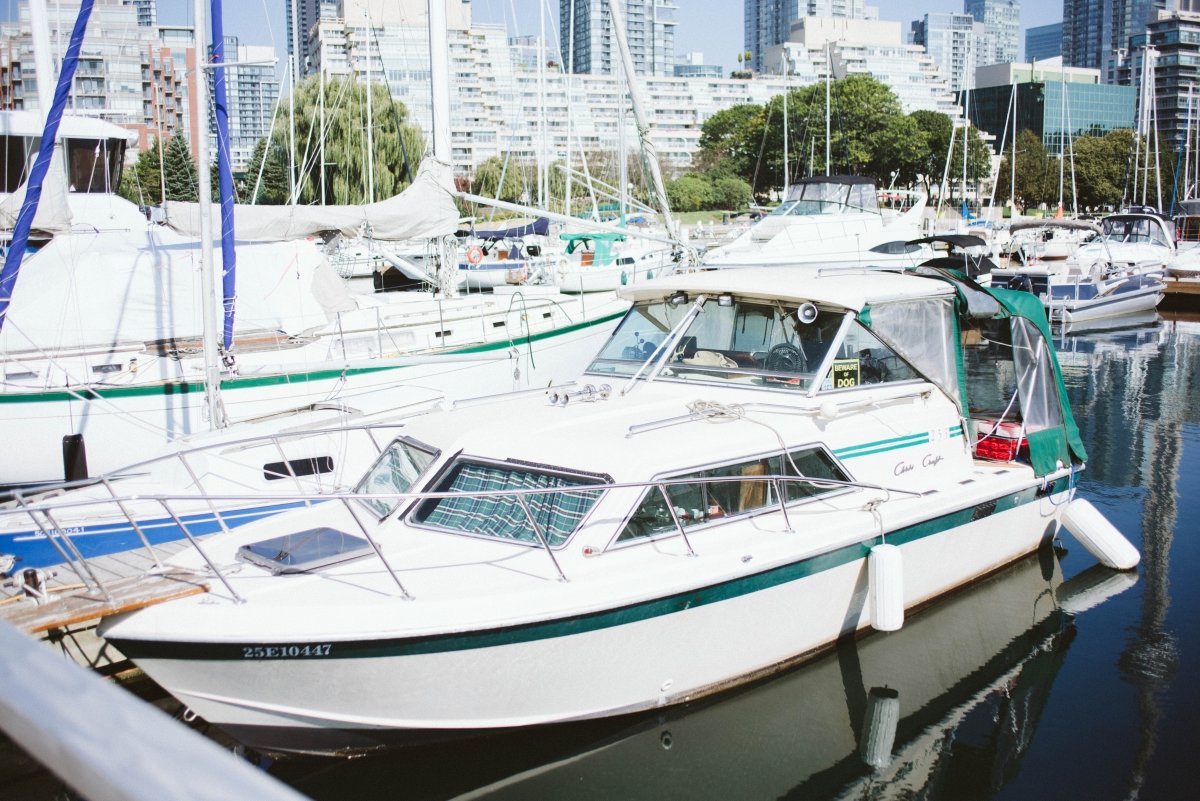Would you like to live in a quiet neighbourhood with cheap rent, a lakeside view and 15 minutes from the heart of the city?
Tashika Gomes, a 32-year-old small business consultant living in Toronto, has all those things. The only difference from her neighbours living in surrounding highrises is that she’s at sea-level — well, lake-level to be more precise.
Two years ago, Tashika and her partner decided to move out of a loft in the Junction, one of Toronto’s hip neighbourhoods, and live on a boat five minutes away from the CN Tower. The move has freed the couple from debt, helped them to save more, and allowed Tashika to quit her job and focus on building her own business.
The boating lifestyle
When I think about boats, it’s hard for a certain lifestyle not to come to mind. Pop culture has inundated us with the idea that boats are for rich people to vacation and party on (remember that song?). But just like cars and homes, there are luxury options as well as affordable ones. It mostly depends on the size.
Tashika and her partner live in a 30-foot 1981 Chris Craft 253 Mercruiser called Cabin I. In terms of size, it’s definitely on the small side, being essentially no bigger than a bachelor apartment. It’s got a cozy (albeit tight) cabin with a bed, a small table, and a counter with a cooking element. It’s far from luxurious, but it's exactly what they were looking for to cut their expenses and put one of their two incomes exclusively towards paying off debt and saving money.
“Our apartment was a really good deal. But there are so many costs associated with having an apartment, and it’s definitely also a lifestyle change just living with less and having less space,” said Tashika when I visited her at her floating home. “It’s just a simpler life.”
Tashika and her partner pay a docking fee of $99.50 per foot per season. With their small boat, it works out to less than $500 per month, giving them plenty of room to afford the other costs that come with boat life such as hydro, fuel, maintenance, winter-proofing, insurance for the boat, and pump-outs (disposing of the boat’s sewage). When they tally up their housing costs, she says they pay about $1,000 per month.

“Because we’ve made that shift [in mentality] — and it’s only been a couple of years — in another year or two we can save enough that we can potentially buy a fixer-upper somewhere close to the city.”
So, what does a 30-foot boat cost?
The initial asking price was $7,500, but Tashika and her partner had to delay their plans a few months due to life circumstances. This turned out to be a stroke of fortune, because the owner had been struggling to sell the boat, and that gave them negotiating power. They managed to get $5,000 off the asking price, scooping it up for a bargain price of $2,500.
A downtown bachelor condo can run upwards of $1,200 per month to rent. To buy, you’re looking at a $300,000 minimum — and at that price point, you’re lucky if that manages to get you more than 400 square feet. Tashika got the boat for just $2,500, and her and her partner are paying almost $1,000 less a month than they would be if they rented a condo, allowing her to invest in her own business and do more travelling.
“Winter can be scary”: What it’s like living on a boat
Neither Tashika nor her partner come from a family of boaters. Neither of them knew anything about boating when they started thinking about buying one. As one can imagine, living on a boat has a learning curve, but if you’re willing to put the effort in, you can research just about anything you need to know about taking care of your vessel and making it livable.
Another important step in the learning process is getting to know your neighbours. Houseboat communities are small and fairly close-knit. If you’re new to houseboat living it’s well worth it to ask a more experienced neighbour or even online communities for help.
“Just ask as many questions as possible,” says Tashika. “There’s still so much to learn every day… There’s always little things that come up and you just figure it out.”
In Canada, winter is a major concern for anyone living on a boat. Tashika says that winterizing a small vessel isn’t too challenging — however, even with all the preparation in the world, being on a boat during the winter is fraught with risk.

“For the winter, you buy a bubbler (or de-icer). It brings warmer water from the bottom of the lake to the surface to prevent ice from being able to form. After that, you build a frame over your boat and wrap it in a special type of plastic that insulates it. And then you have a heater, and it’s actually very warm and cozy.” She also mentions the importance of properly winterizing your engine. “If you do everything fairly well, you should be okay.”
Even though it isn’t hard to keep the boat warm, Tashika says it can be scary during storms. “The storms can be pretty bad in the winter. I remember one particular night there was an ice storm, we were out there probably for four hours breaking ice from around the boat at like 2 am. So, we’ve definitely had some sleepless nights, and I’ve definitely run out in the middle of the night to see if we were sinking because of the sound of ice crashing into the boat.”
For boaters, storm damage is probably the biggest threat to their home. “Maybe once a year, a boat takes on water, but generally it’s okay.”
On the off chance that they do suffer heavy damage or sink, their boat insurance completely covers them for just a couple hundred dollars a year.
Is the boat life for you?

Living on the boat has not only saved Tashika and her partner money, but it’s taught them new skills and given them more freedom in their day-to-day life.
Living on a boat, however, isn’t a lifestyle everyone can adjust to. You’ll also have to sacrifice some of the space and comfort of a full-size apartment if you’re trying to save money. You’ll have to get used to sharing cramped spaces, like the kitchen and sleeping area. And no matter how hard you try, there’s always a risk of your boat being damaged, so you’ll need to be careful about leaving it unattended. (Also, a boat isn't an investment: like a car, its value will only depreciate and it takes effort to keep it maintained.)
But for Tashika, there's never been any regret about making the move. She says the personal development she's experienced on the boat is more than worth it.
“I think it’s really peaceful and helps me focus a lot with my business, and it definitely stimulates my partner creatively,” she says. “The energy is just a bit different, being so close to the water. [You feel] like you’re in the city, but you’re also away from it in a sense.”
Photos by Sandra Brzezinski.
